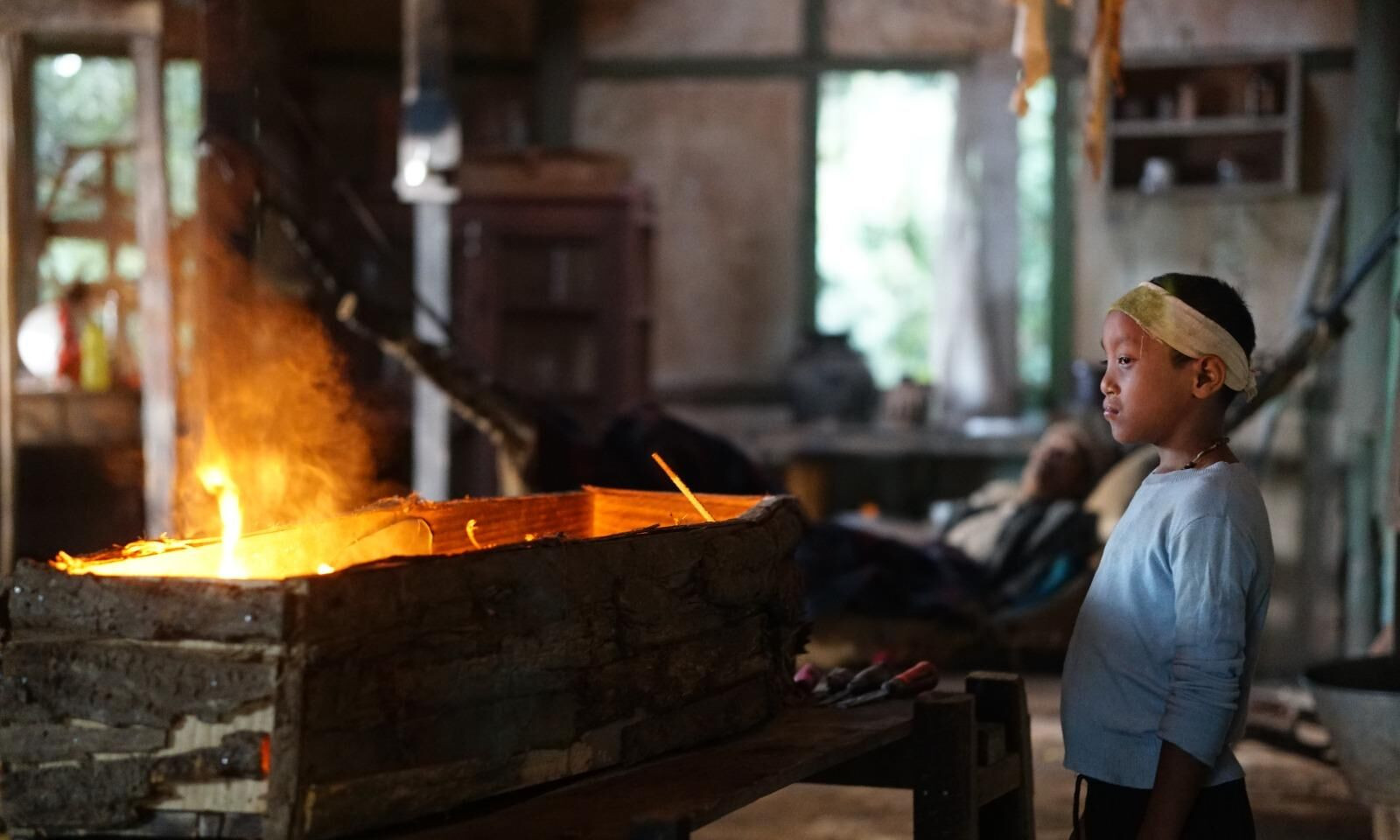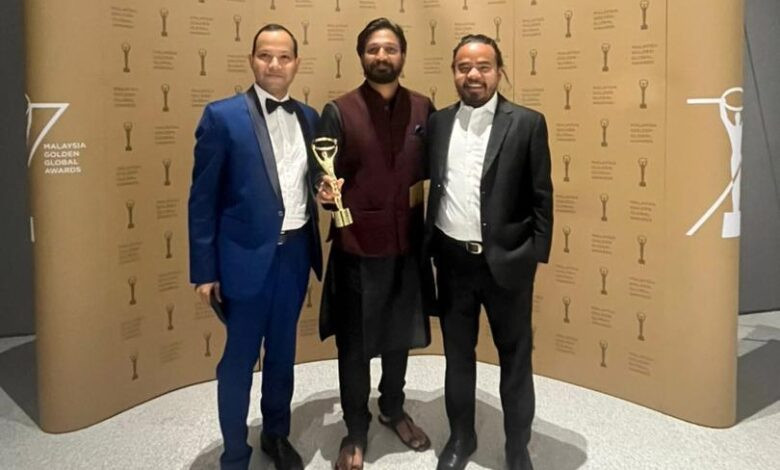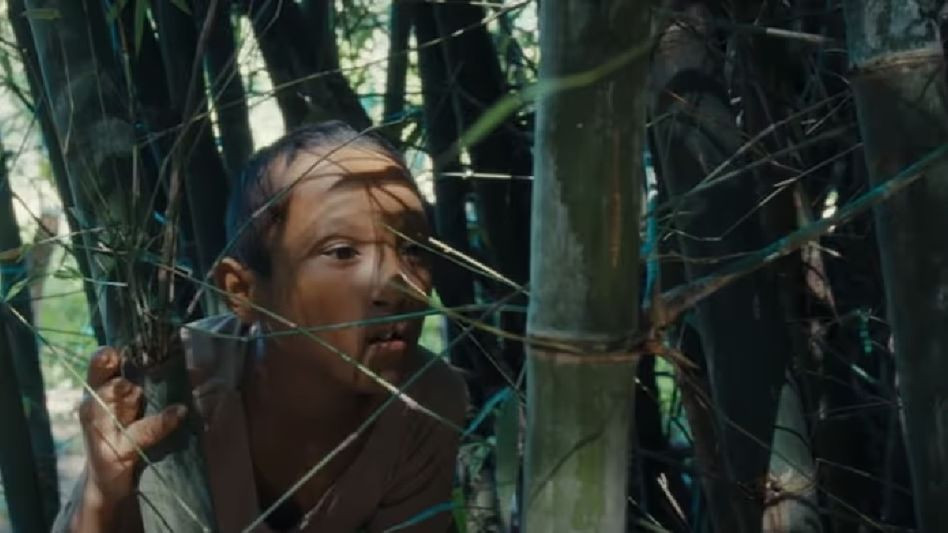“Life is like an onion; you peel off a layer at a time and sometimes you weep.” -Carl Sandburg
I am ‘the other’ as far as movies are concerned. But even ‘the other’ can look at the movie and give a layman’s point of view. The first thing that I would like to say about Dominic Megam Sangma’s movie “Rapture” is that it is heavily nuanced. There are so many layers and perspectives and adumbration to it. The movie seems to have so many trajectories; but in the end all of that is united and connected and twined in one cord called humanity.
The movie does not allow time for respite, not even for a piece of popcorn. Right from the word go, spectators panted and gasped as the characters in the movie ran into the house, ran outside the house, “katroro katjojo” spread out in the forest looking for lost fellow villagers. Not that it did not have moments of laughter – the movie had its humourous moments, albeit born of irony!
A Deep-Rooted Fear
The first obvious theme is that of fear, unfounded fear, ‘uninvestigated’ fear and fear-mongering. It could have been fear based on genuine reason but for lack of systematic investigation. The villagers lack scientific approach to fear and resorted to prayer, superstition, and more fear-mongering. Xenophobia loomed large over the village, and to this was added the fear of the impending days of darkness, which could only be dispelled with a ‘blessed candle’.
The theme of fear is highlighted with the subtle interplay of light and darkness. The movie began with the villagers gathering the cicadas at night with the help of lanterns, torches and flambeaux. The various references to “andala re·bana skang” (before darkness comes/overtakes) intensifies the general vague idea of fear. However, the fear is real although the idea is vague. Here the concrete religious reference to days of darkness denotes both itself and the existential fear of men. This existential fear rules the roost. Yet in this chaotic, fear-driven village, there is the figure of sanity and the voiceless voice of ‘knowledge’ in the persona of Sobel. He depicts a kind of ‘sang froid’ in the midst of din and anxiety that grip the village. He is mute but he speaks the language of knowledge of time and tide. The feathery device he creates may be connected with the appearance of a ghastly figure swaying at night. The director cleverly leaves out any direct association, may be to enable the cine-goers to draw their own analogies. Those who have read William Goldings novel “Lord of the Flies” may detect some form of kinship between this fearful vision and that of the ‘monster’ witnessed by many characters in that novel. As fear reaches the climax, even those like father of Kasan, who clung on to honest way of life gives in to a sort of ennui and began to long for the rumoured days of darkness. He knew that he and his family were being persecuted by the village because they were ‘different’. Suddenly he, who has played the central role in defending the village, is pushed to the periphery. He then wished for the darkness to come fast, just so that he could take refuge in it and he took consolation in the thought that perhaps when enveloped by darkness, there would be a kind of leveling of people, that egalitarian society which could not be built during light might come about in darkness.
The Blurred Lines of Central and Periphery
The distinction between the centre and the periphery gets blurred. The emphasis is clear: the perspective that matters is the perspective you get from where you stand and not from where others stand…. What is central to one is the periphery and the margin to the other. What others have relegated as quite not important may, like Sobel, see things which others are unable to see and assume centrality in some quiet way. Children too find themselves in this drama. Kasan never stoops to lies, he does not acquiesce. His is the message of truth- “out of the mouth of babes”. So the little ones, who are often marginalized become great in practice of values and the seemingly wise adults fall behind.
The Religious Ambiguity of the Film
Dominic appears to have drawn from his knowledge of religion mixed with hearsay and gossip and the observed hypocrisy within religions and the so-called leaders of religion. He has brought in a lot of sense of duality and ambiguity and sense of illusions. The movie makes a silent statement that what appears to be, is not what it is in reality.
The Boomerang Effect of Fear
The fear factor was not addressed by the villagers in the way it should have been and so also the other issues. The approach to problems were tentative and not committed. Everything becomes tentative. And in such a situation, when people are not committed to go the whole hog, things that they plan and state becomes boomerangs and their fears become self-prophetic. They create excellent snares but for lack of clarity and vague notion of their target, they get hoisted by their own petard.
Mutual Fear and Blurred Identities
However, the fear appears to be mutual, and the profile of the aggressor and the victim/object gets blurred at a certain point. There is this scene of meeting: Kasan and his uncle Sobel on one side and a non-Garo family on the other. Both the parties are unsure of the other and stood still for sometime. They are seen to be mutually suspicious of the other. However, the innate simplicity of the Garos in general got the better of Kasan and his uncle and they let the strangers pass before they themselves resume their way. The behavioural pattern here is subtle and almost imperceptible. But given a proper thought it may be seen that the behaviour stems from a deep-seated lack of self-assertion on the part of the Garo villagers. This behaviour pattern seems to be nice but in this dog-eat-dog world, it is not always nice to be nice.
Irony and Metaphor in the Narrative
Deeply implanted in the narrative is the sense of irony. The title of the movie itself may appear misleading and those that are not open to more than one layer of interpretation and screen-semiotics may find themselves deeply disappointed. There is great irony depicted by the character of the pastor who later is found to be deceptive and depraved. It is ironic the way the candle is always kept lit in front of the picture of Mother Mary, while the pastor and his paramour commits adultery in the same room. To the very sensitive, the gorging on luscious papaya may imply metaphorical association to sensual pleasure leading to lechery.
A Multifaceted Story
Thus a number of themes, polarities, imageries, metaphors, etc are played out one against the other: light and darkness, religion and superstition, the sacred and the profane, physically whole and the differently-abled, the centre and the periphery, adult and children, not to forget self and the other.
A Movie for Everyone
All in all, it is a thought-provoking movie. There are a number of baffling scenes, whose implications one can only conjecture. It remains in the end, a movie from where every spectator can carry back home something, beginning from philosophical musings to laughter and the sense of the uncanny.
Sangma's Success Highlights Northeast's Potential
Dominic Sangma has won yet another award for the Garo film Rapture as he was named Best Director Critics’ Choice at the Indian Film Festival of Melbourne (IFFM) 2024. This win comes on the heels of other accolades for the film, including Best Cinematography at the Malaysia International Film Festival 2024 and the NETPAC Award at MAMI 2024. Rapture has also been nominated for the prestigious Asian Academy Awards and has earned accolades at the Asia Pacific Screen Awards.
Sangma’s success is a testament to his talent and dedication to storytelling. His work is also significant for showcasing the rich cultural tapestry of the Northeast, inspiring a new generation of filmmakers from underrepresented communities. Sangma's success further proves that there are compelling stories to be told from the Northeast and his work is helping to bring these stories to a wider audience.
Award-Winning Director and His Film
Here is a glimpse into Dominic Sangma's latest win and the film that has garnered critical acclaim:
-
Best Director Critics’ Choice: This award was bestowed upon Dominic Sangma for his exceptional direction of Rapture at the Indian Film Festival of Melbourne (IFFM) 2024.
-
Rapture's Accolades: Rapture has been recognized for its cinematic brilliance, winning Best Cinematography at the Malaysia International Film Festival 2024, the NETPAC Award at MAMI 2024, and being nominated for the prestigious Asian Academy Awards and earning accolades at the Asia Pacific Screen Awards.
-
Sangma's Impact: His work continues to break new ground and inspire a new generation of filmmakers from underrepresented communities. It shines a spotlight on the vibrant stories and voices from the Northeast, showcasing the rich cultural tapestry of the region.
This is a testament to the potential of the Northeast to produce world-class films and contribute to the global cinematic landscape.


















